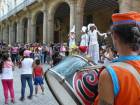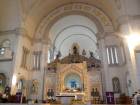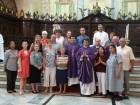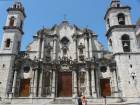








When it comes to Cuba, Peter Sanchez takes a long view—an extremely long view.
The 50-year-old travel agent was born in Cuba, is happily married to a Cuban woman and for the past 13 years has headed Cuba Tours and Travel, a Long Beach, Calif., agency that books trips to the island-nation.
And Sanchez would not have it any other way, he told CNY during an interview in the lobby of Hotel Quinta Avenida in Havana, where some pilgrims from the Archdiocese of New York were staying during Pope Benedict XVI’s visit to Cuba this week.
“I feel just as comfortable in both cultures,” said Sanchez, referring to the United States and Cuba. “My mission is that both cultures understand each other.”
Sanchez said he thinks tourism can link the two countries, and believes that a connection between religious people of the two nations is a natural avenue to pursue.
That’s one reason that the papal visit left him feeling both encouraged and a little frustrated.
“I’m hoping that the pope’s visit will again bring Cuba into the light of Catholics,” Sanchez said.
By “again,” Sanchez was, of course, referring to Pope John Paul II’s 1998 visit, and its profound impact on Church life in Cuba.
“When Pope John Paul came, Cuba was basically atheist,” he said. In the aftermath, religion was “no longer a black mark” in Cuba.
Sanchez, who is Catholic, said he is hopeful that Pope Benedict’s trip will also have a similar lasting effect.
His frustration as a tour operator has been an inability to crack the Catholic market until now. The California native has led trips for Greek Orthodox, Episcopal and Jewish religious groups.
The Catholic Church in Cuba provides many charitable services from feeding programs for the poor and elderly to donations of clothing. Sanchez said that as Cuba’s Communist government transitions to a more capitalistic economic system in the coming years, many people, especially the elderly, will fall through the cracks.
“The Church is a safety net,” he said.
As Catholics, he said, “We need to support the churches. They are doing amazing work.”
In fact, pilgrims traveling with religious organizations on programs of religious activities are one group of Americans that do not need a special license to visit Cuba. Sanchez said he believes that religious travel will continue no matter which party wins the U.S. presidential election in November.
Sanchez came to the United States with his family as a 6-month-old and grew up in Culver City, Calif. He was working as a private investigator before a serious eye condition left him legally blind for three years and also led him to meditate on his future. He first returned to Cuba in 1996, a trip that “completed me,” he said.
“Part of me was missing until I came back to where I was born,” he said.
After founding his own company in 1999, Sanchez said his first “home run” was the 2000 Biennial of Havana, a Latin American art exhibit for which he brought groups of patrons from seven museums in the United States.
He has faced many ups and downs over the years, depending on the politics of the day, but he never considered shuttering his company, no matter how poor the bookings were or what sacrifices he had to make to stay open. At one point, he even moved his offices into his apartment.
“I’m in it for the long haul,” Sanchez said. “I love the people, the culture, and I love the people that travel with me…It’s coming from the heart.”
He said he would love to show fellow Catholics the Church and the culture of different regions of his native land from Havana to Camaguay to Santiago in travel programs with accommodations ranging from modest to luxurious.
Even the most experienced American travelers would find the prospect of a visit to Cuba intriguing, Sanchez said. “Cuba is the last place in the world people haven’t seen. We need churches to come here. It might attract people who have never traveled with the Church,” he said.
“They might then become more involved in the Church.”